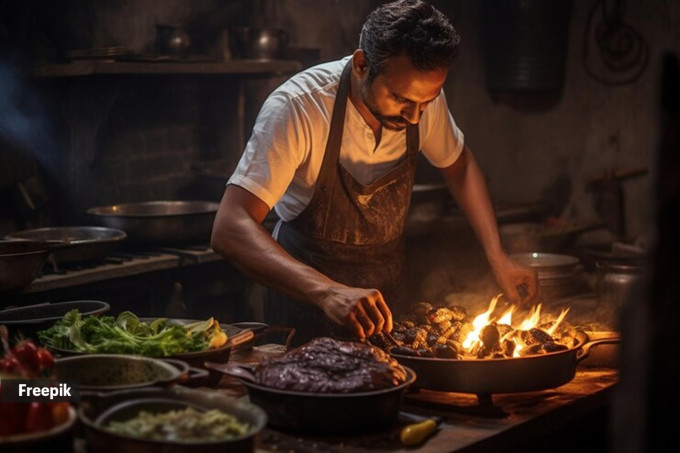‘Recipes used to be secret,’ says Chef Sanjeev Kapoor: How competition and obsession with secrecy in the food industry can limit creativity
Celebrity chef Sanjeev Kapoor recently shed light on an often-overlooked aspect of the food industry: the intense competitiveness surrounding the invention of popular dishes and the guarded secrets of recipes.
During an episode of a podcast hosted by Siddharth Kannan, he said, “Hum kuch seekhne ke liye gaye toh ustad jo hai jab kuch ki critical component hota tha humein bolenge achha jao ke wo le aao. Aur phir wo, so there was a lot of secrecy. Recipes used to be secret. (When we went to learn something, the master would tell us to go fetch something when it came to a critical component. So, there was a lot of secrecy. Recipes used to be secret.”

He added that they would keep skills to themselves in their field. So, Kapoor made a promise to himself very early on in his first job that whatever he would learn, he would teach as quickly as possible. “So, before TV started, wherever I worked, I was teaching. And not just in the hotel I was working at, I would take classes.”
He also talked about the competition that is still very prevalent in the food industry, and remarked, “Isme aisa nahi hona chahiye ki ‘ye mera hai’. Abhi main jab dekhta hoon ki ‘butter chicken humne invent kiya’… khaana… isme koi woh mat rakho… ki ye mera hai tumhara hai. Sabka jo ghar pe bana raha hai uska hai. (It shouldn’t be like, ‘This is mine.’ Now when I see things like ‘we invented butter chicken’… food… don’t have that attitude… that this is mine or yours. It belongs to everyone who’s making it at home).”
He continues to add that the recipe he made in the first episode of ‘Khana Khazana’ became so popular that it was used in several restaurants and households. Kapoor did not want to keep the recipe just to himself and wanted the world to try it out. “Khaane mein itni saari cheezein hai aap seekhte ho… aap thodi usko royalty de rahe ho? (There are so many things in food that you learn… are you really going to give it royalty?)”
In a field where culinary creations are as much about tradition as innovation, these aspects can sometimes stifle the creativity that drives the evolution of cuisine.
Biraja Rout founder at Beamer Brands and Biggies Burger, agrees, “Secrecy in recipe sharing can create barriers that stifle the natural flow of creativity and collaboration within the culinary world. When chefs and restaurants guard their recipes too closely, it limits the ability of others to learn from and build upon those ideas. ”
In a field that thrives on innovation, he says, keeping recipes secret creates silos where knowledge is restricted to a select few, rather than shared for the benefit of the entire industry. Cuisine evolves through experimentation, reinterpretation, and cross-cultural influences.
Historical examples where openness in recipe sharing led to significant advancements in the culinary world
Rout highlights several examples of culinary evolution driven by openness. In the 18th and 19th centuries, French chefs like Marie-Antoine Carême and Auguste Escoffier documented and shared their recipes and techniques. Escoffier, in particular, codified French cooking methods, setting the stage for modern haute cuisine through global dissemination.
Italian cuisine also spread globally through the efforts of immigrants who shared their recipes and techniques, allowing dishes like pasta and pizza to evolve and become universally beloved.
More recently, he states, the molecular gastronomy movement was propelled by chefs such as Ferran Adrià and Heston Blumenthal. Their willingness to share experimental techniques through books, interviews, and demonstrations inspired new ways of thinking about cooking.
 Collaboration can actually enhance originality by exposing chefs to new perspectives, techniques, and ingredients that they may not have encountered otherwise. (Source: Freepik)
Collaboration can actually enhance originality by exposing chefs to new perspectives, techniques, and ingredients that they may not have encountered otherwise. (Source: Freepik)
Balancing the need for originality with the benefits of collaboration and openness
Balancing originality with collaboration and openness requires a shift in mindset from protecting ideas to fostering creativity through shared knowledge, notes Rout.
He adds, “Chefs and culinary institutions can achieve this balance by recognising that originality doesn’t necessarily mean creating something entirely new from scratch but can also involve reinterpreting or elevating existing ideas in new and unique ways.”
Collaboration can actually enhance originality by exposing chefs to new perspectives, techniques, and ingredients that they may not have encountered otherwise. One practical way to balance originality with openness is for chefs to be transparent about their influences and inspirations while still putting their own unique spin on the dishes they create.
📣 For more lifestyle news, click here to join our WhatsApp Channel and also follow us on Instagram
Disclaimer: The copyright of this article belongs to the original author. Reposting this article is solely for the purpose of information dissemination and does not constitute any investment advice. If there is any infringement, please contact us immediately. We will make corrections or deletions as necessary. Thank you.

